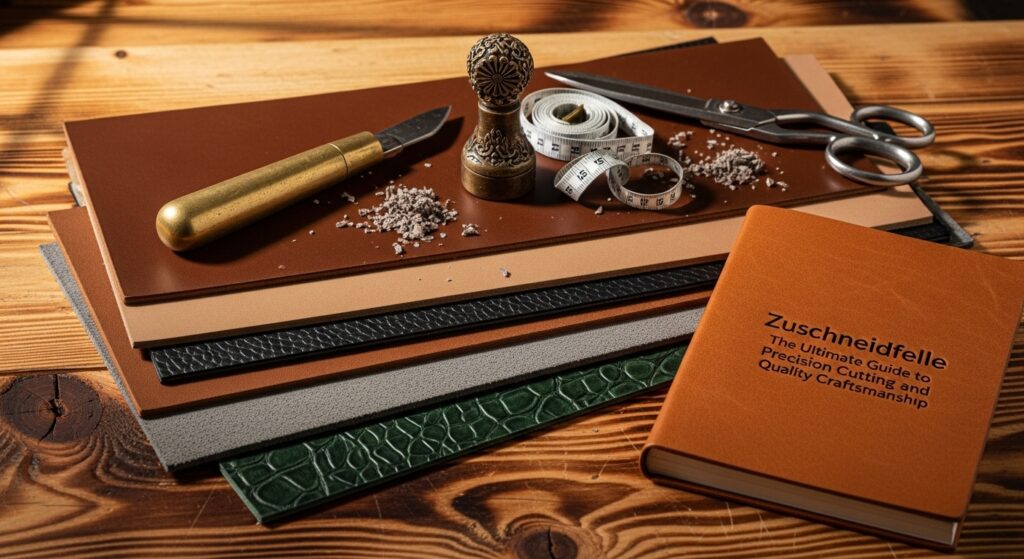In the world of fine craftsmanship, Zuschneidfelle plays an essential role in delivering precision, texture, and durability to handmade products. Whether in leatherworking, tailoring, or upholstery, Zuschneidfelle—translated as cutting hides or cut-to-size leather/fur—represents excellence and skill. This guide explores the meaning, uses, and importance of Zuschneidfelle, providing insight into how it shapes high-quality creations across industries.
Understanding Zuschneidfelle
The term Zuschneidfelle comes from the German words “zuschneiden” (to cut) and “Felle” (skins or hides). It refers to hides or furs that are pre-cut or precisely measured for specific purposes. Zuschneidfelle are typically used by artisans who need consistency, smoothness, and accurate dimensions for crafting items like garments, bags, gloves, rugs, or furniture coverings.
| Aspect | Description |
|---|---|
| Term Origin | German: “Zuschneid” (cutting) + “Felle” (skins/hides) |
| Common Use | Leathercraft, tailoring, upholstery |
| Material Types | Cowhide, sheepskin, goatskin, synthetic furs |
| Key Feature | Precision-cut for uniform texture and size |
Zuschneidfelle is not just a material; it’s a symbol of quality and careful preparation. In industries where detail matters, artisans rely on these pre-cut hides to save time and maintain product uniformity.
The Role of Zuschneidfelle in Leathercraft
In leathercraft, Zuschneidfelle provides a foundation for producing luxury items. Craftsmen require hides that are already trimmed, measured, and quality-checked to ensure seamless assembly.
Leatherworkers often use Zuschneidfelle to create:
-
Handbags with even grain and texture.
-
Wallets and belts with consistent thickness.
-
Furniture upholstery that matches across panels.
The keyword Zuschneidfelle represents efficiency and quality assurance in the production chain. Instead of manually cutting raw hides, artisans receive pre-cut material that meets standard dimensions—reducing waste and improving precision.
Types of Zuschneidfelle
There are several types of Zuschneidfelle, depending on material and intended use. Each type offers unique benefits for specific applications.
| Type of Zuschneidfelle | Material Used | Primary Application | Key Advantage |
|---|---|---|---|
| Cowhide Zuschneidfelle | Genuine cowhide | Furniture, belts, shoes | Durability and strength |
| Sheepskin Zuschneidfelle | Natural sheepskin | Clothing, rugs | Softness and warmth |
| Goatskin | Goatskin leather | Gloves, wallets | Flexibility and fine grain |
| Synthetic Zuschneidfelle | Artificial fibers | Upholstery, décor | Cost-effectiveness and uniformity |
By choosing the right type, manufacturers can enhance product comfort, longevity, and aesthetic appeal.
Zuschneidfelle in Tailoring and Fashion
Fashion designers and tailors value for its ready-to-use precision. Whether designing a winter coat, a pair of gloves, or an exclusive accessory, the quality of the hide influences both comfort and appearance.
When working with:
-
The fabric or hide is already measured to fit patterns.
-
Edges are smooth, preventing material loss during cutting.
-
The surface texture is controlled, ensuring consistent visual appeal.
This is why high-end fashion houses often collaborate with suppliers who specialize in premium Zuschneidfelle. These hides allow for quicker production cycles without compromising craftsmanship.
Environmental and Ethical Considerations
Sustainability plays an increasingly important role in the world of. Modern producers emphasize ethical sourcing, ensuring hides come from byproducts of the food industry or sustainable farms.
| Sustainability Factor | Details |
|---|---|
| Source | Byproduct of meat industry, not hunted animals |
| Processing | Eco-friendly tanning with reduced chemical use |
| Recycling | Leftover scraps reused for small accessories |
| Certifications | ISO, Leather Working Group (LWG) standards |
By prioritizing ethical Zuschneidelle, manufacturers align with environmental goals and appeal to eco-conscious consumers who value transparency and responsibility in production.
How Zuschneidfelle Ensures Precision and Efficiency
The most notable feature of is precision. These hides are cut with advanced tools—laser cutters, mechanical blades, or automated systems—that deliver flawless dimensions.
Benefits of using include:
-
Reduced material waste: Pre-cut hides minimize leftover scraps.
-
Time efficiency: Artisans can start production immediately.
-
Quality control: Each piece undergoes inspection before shipment.
-
Consistency: Uniform pieces improve final product aesthetics.
| Production Stage | Benefit of Zuschneidfelle |
|---|---|
| Pattern Preparation | Accurate shapes without extra trimming |
| Assembly | Smooth alignment of panels |
| Stitching | Consistent seams and fit |
| Finishing | Professional and balanced appearance |
This precision ensures every handbag, jacket, or furniture piece achieves the same high standard of craftsmanship.
Zuschneidfelle in Home Décor and Upholstery
Beyond fashion, is a key material in home décor and upholstery. Its soft texture and luxurious look make it ideal for rugs, cushions, and furniture coverings.
Sheepskin, for instance, adds warmth and comfort to interiors, while cowhide versions provide durability and a rustic charm. When combined with modern furniture design, enhances both function and aesthetic appeal.
Interior designers often prefer because it:
-
Adapts to various design themes (rustic, modern, Scandinavian).
-
Is easy to maintain with proper care.
-
Adds natural insulation and comfort.
Maintaining and Caring for Zuschneidfelle
Proper maintenance is essential for extending the life of. Whether natural or synthetic, hides require gentle care to preserve their look and softness.
Care Tips for:
-
Avoid direct sunlight to prevent color fading.
-
Regularly brush with a soft brush to maintain fluffiness.
-
Clean stains immediately with mild soap and lukewarm water.
-
Store in a dry place to prevent mold growth.
-
Avoid machine washing for natural hides.
With consistent care, products can last for years, retaining their texture and natural sheen.
The Future of Zuschneidfelle
The future of lies in innovation and sustainability. As technology evolves, producers are experimenting with plant-based and lab-grown alternatives that mimic the feel of real leather. These eco-friendly options could revolutionize the industry, balancing quality with environmental care.
Future developments may include:
-
Smar with stain-resistant coatings.
-
Recyclable or biodegradable synthetic hides.
-
Custom laser-cut designs for fashion and interiors.
Such advancements promise to make more versatile, sustainable, and widely accessible.
Conclusion
Zuschneidfelle is a symbol of precision, quality, and timeless craftsmanship. From luxury fashion and upholstery to interior design and accessories, it embodies the harmony between artistry and practicality. With sustainable production and innovative technologies shaping its future, continues to define excellence in modern manufacturing.
Whether you are an artisan, designer, or enthusiast, understanding gives you insight into one of the most refined materials in creative industries—a true blend of tradition, innovation, and responsibility.






